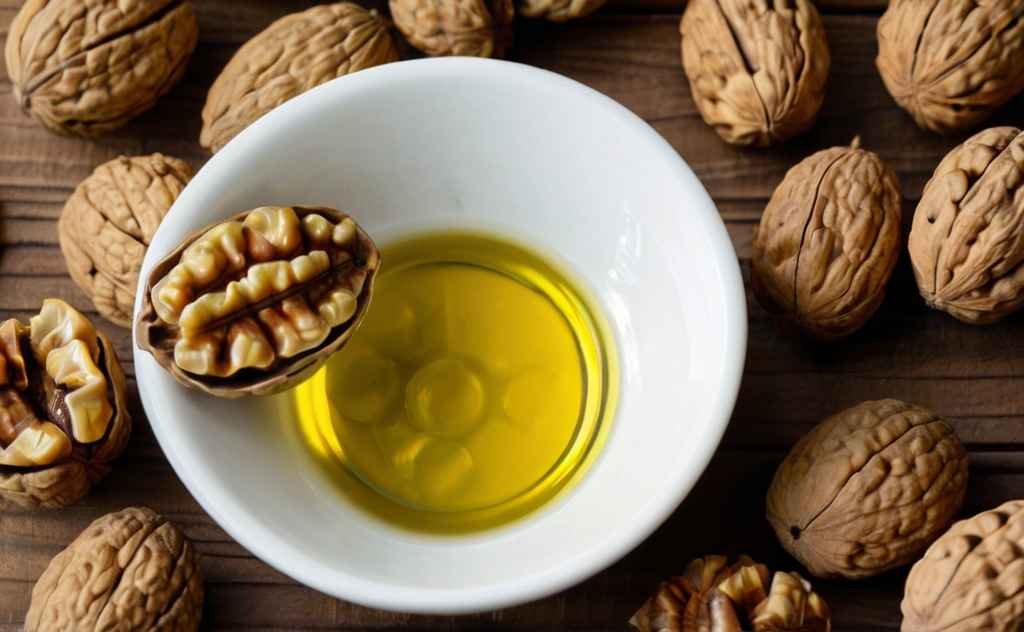Walnut oil, derived from the nuts of the walnut tree, is not only prized for its rich, nutty flavor but also for its numerous health and beauty benefits. This article will delve into the various use walnut oil and advantages of incorporating walnut oil into your daily routine.
Types of Walnut Oil
There are two primary types of walnut oil available: cold-pressed and refined.
Cold-Pressed Walnut Oil
Cold-pressed walnut oil is extracted from dried walnuts without the use of heat or chemicals. This method preserves the oil’s natural flavor, aroma, and nutritional content, making it ideal for culinary applications.
Refined Walnut Oil
Refined walnut oil undergoes a process involving heat and chemical solvents to remove impurities and extend its shelf life. While it may lack the robust flavor of cold-pressed walnut oil, it has a higher smoke point, making it suitable for cooking at higher temperatures.
Nutritional Benefits of Walnut Oil
Walnut oil is a nutritional powerhouse, containing essential nutrients such as omega-3 fatty acids and antioxidants.
Omega-3 Fatty Acids
Omega-3 fatty acids are crucial for heart health and brain function. Incorporating walnut oil into your diet can help reduce the risk of cardiovascular diseases and support cognitive function.
Antioxidants
Walnut oil is rich in antioxidants, which help combat oxidative stress and inflammation in the body. These compounds contribute to overall health and well-being.
Culinary Uses of Walnut Oil
To use walnut oil adds a unique flavor and depth to a variety of dishes, making it a versatile ingredient in the kitchen.
Salad Dressings and Marinades: To use walnut oil as a base for homemade salad dressings and marinades to impart a rich, nutty flavor to your favorite greens and meats.

Cooking and Baking: Replace butter or vegetable oil with walnut oil in cooking and baking recipes to add a subtle nuttiness to your dishes. It works well in both savory and sweet recipes, from sautéed vegetables to baked goods like cakes and cookies.
Beauty and Skincare Uses of Walnut Oil
In addition to its culinary benefits, walnut oil is also prized for its moisturizing and nourishing properties for the skin and hair.
Moisturizer for Dry Skin: Apply walnut oil topically to dry, rough patches of skin to hydrate and soften them. Its lightweight texture absorbs quickly, leaving your skin feeling smooth and supple.
Hair Care: To use walnut oil as massage walnut oil into your scalp and hair to condition and strengthen your locks. It helps nourish the hair follicles, promote healthy growth, and add shine to dull, dry hair.
Explore: Benefits of Walnut oil for skin whitening

Health Benefits to use walnut oil
Regular consumption of walnut oil can have a positive impact on various aspects of health and well-being.
Heart Health: The omega-3 fatty acids in walnut oil help reduce cholesterol levels and lower the risk of heart disease. To use walnut oil into your diet as part of a balanced meal plan can support cardiovascular health.
Brain Health: The antioxidants and omega-3s found in walnut oil are beneficial for brain function and cognitive health. To use walnut oil in your diet may help improve memory, concentration, and overall brain function.
How to Store Walnut Oil
To preserve its freshness and flavor, store walnut oil in a cool, dark place away from heat and light.
Storage Tips: Transfer walnut oil to a glass bottle with a tight-fitting lid to protect it from air and light exposure. Keep it refrigerated to extend its shelf life and prevent oxidation.
Shelf Life: Unopened walnut oil can last for up to two years when stored properly. Once opened, use it within six months to ensure optimal freshness and quality.

Tips for Buying Walnut Oil
When purchasing walnut oil, consider the following factors to ensure you’re getting a high-quality product.
Quality Considerations: Opt for organic, cold-pressed walnut oil whenever possible to ensure maximum flavor and nutritional value. Look for reputable brands that prioritize quality and sustainability in their production methods.
Packaging: Choose walnut oil packaged in dark glass bottles to protect it from light exposure, which can cause oxidation and rancidity. Avoid plastic containers, as they may leach harmful chemicals into the oil over time.
Precautions and Side Effects
While walnut oil offers numerous health benefits, it’s essential to use it in moderation and be aware of potential side effects.
Nut Allergies: Individuals with nut allergies should avoid walnut oil to prevent allergic reactions. If you have a known allergy to tree nuts, consult with your healthcare provider before using walnut oil in any form.
Moderation: Like all fats and oils, walnut oil is calorie-dense, so it’s essential to use it sparingly as part of a balanced diet. Excessive consumption may lead to weight gain or digestive issues in some individuals.
Conclusion
In conclusion, walnut oil is a versatile and nutritious ingredient that offers a myriad of culinary, beauty, and health benefits. Whether you’re using it to enhance the flavor of your favorite dishes, nourish your skin and hair, or support your overall well-being, incorporating walnut oil into your daily routine is a simple yet effective way to harness its many virtues.
FAQs:
- Can walnut oil be used for cooking?
- Yes, walnut oil is suitable for cooking and baking, adding a rich, nutty flavor to a variety of dishes.
- Is walnut oil good for skincare?
- Absolutely! Walnut oil is prized for its moisturizing and nourishing properties, making it an excellent natural remedy for dry skin and hair.
- What are the health benefits of walnut oil?
- Walnut oil is rich in omega-3 fatty acids and antioxidants, which support heart health, brain function, and overall well-being.
- How should walnut oil be stored?
- Store walnut oil in a cool, dark place away from heat and light, preferably in a glass bottle with a tight-fitting lid to preserve its freshness and flavor.
- Are there any precautions to consider when using walnut oil?
- Individuals with nut allergies should avoid walnut oil, and it should be used in moderation due to its calorie density. Consult with a healthcare professional if you have any concerns.


4 Comments
[…] Explore: How to use walnut oil ? […]
[…] Explore: How to use walnut oil ? […]
[…] Explore: How to use walnut oil ? […]
[…] Explore: How to use walnut oil ? […]